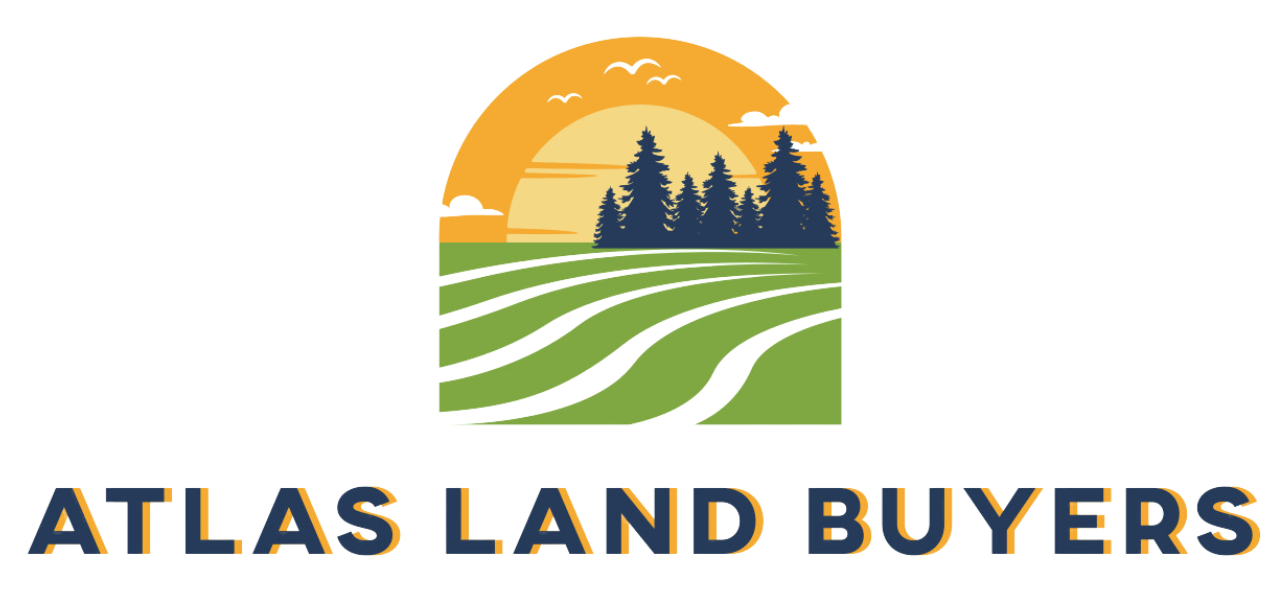
Profiting from a property sale can be a positive achievement; however, there are a number of risks involved, too. Familiarity with trends associated with fraudulent transactions will be helpful in ensuring the successful closing of a sale. This guide from Atlas Land Buyers addresses common warning signs of fraudulent transactions and provides essential tips for landowners to avoid losing their land to scams, thereby ensuring the protection of their real property. By educating themselves, landowners will be able to complete their sales confidently in the knowledge that they are actively trying to avoid selling their land in a fraudulent transaction. Protect yourself financially by understanding the trends associated with scams in land transactions.
Understanding Common Land Sales Scams

Selling land presents a valuable opportunity, though it does come with the risk of falling victim to fraud. For this reason, it is important to understand how fraudsters target land sellers and the typical patterns of deception. Effective measures to combat fraud can include strengthened customer protection and identity verification to undermine a scam’s success. This section will prepare you with the knowledge necessary to identify fraud and to avoid it in land dealings.
Recognizing the Red Flags of Fraudulent Deals
In the multifaceted discipline of land sales, the importance of safeguards to prevent scams cannot be overstated. One obvious warning sign when selling land is the lack of documentation. Legitimate land buyers tend to be very thorough in requesting ownership verifications and will require all documentation to be in order before taking any further steps. Fraudulent buyers tend to be more aggressive and will attempt to convince the seller to expedite the procedure or to omit vital steps. To avoid this type of scam, maintain your standards and always defend your reputation.
The demand for upfront fees constitutes another red flag. Although fees are legitimate costs in property sales, being pressured for unsubstantiated costs should prompt concern. Scammers try to disguise sales scams as legitimate processing fees and deposits. Be thorough in checking the validity and reasoning behind all costs being asked for. The implementation of identity verification will help in ascertaining buyer legitimacy from the estate sector. In addition to this, inconsistent buyer data is also a cause for concern. In any case, discrepancies or evasiveness regarding overall intent should prompt verification for possible fraud in the property sector. Honest buyers will provide coherent, consistent information and will respond fully to any and all queries posed. Verification of identity in land transactions is also a way of fraud mitigation and should be a minimum standard. Be especially cautious of buyers who pressure for rapid deal closures, as this is detrimental to proper evaluation. Irrespective of the type, legitimate transactions will offer the time necessary for due diligence. It is essential to know these in order to provide a failsafe for the assaults of sales scams and unfettered sales.
| Red Flags | Protective Measures | Benefits of Vigilance |
|---|---|---|
| Unverified ownership documents | Consult with legal experts | Reduces risk of fraud |
| Pressure to purchase quickly | Conduct thorough research | Ensure informed decisions |
| Suspiciously low prices | Verify property credentials | Avoids financial loss |
| Incomplete property information | Inspect property personally | Increases transaction confidence |
This table highlights critical aspects essential for recognizing and preventing land sales scams, providing a structured overview for safer transactions.
How to Protect Yourself from Sales Scams
Adopting protective measures against possible land sales scams requires strategic preparations and planning. The need to conduct extensive research cannot be overstated. To spot genuine opportunities and identify potential scam threats, understanding the market and its potential buyers is critical. Since marketing land for sale requires knowledge of property values, the real estate market, and the legal frameworks associated with land sales, passing with flying colors is indispensable. This knowledge allows the seller to have a fighting chance against the complex challenges of property fraud and real estate.
To minimize real estate fraud, reputation, financing, and buyer identity checks should be completed using reliable sources. The interests of the buyers should be documented using signed contracts, and the contracts should be validated by a real estate attorney. Reporting fraud to wireless consumer protection and describing the fraud for public knowledge should be encouraged. Lastly, property transactions should be conducted using safe and verified systems to minimize the likelihood of fraud and ensure document transparency.
Identifying and Preventing Property Fraud
Sellers must identify and deal with potential fraud risks in land sales. Understand how to authenticate buyer motives to close secured transactions. This will strengthen your defenses against possible fraud. The proactive measures outlined in this section focus on the seller and the seller’s fraud risk management framework. The keys to fraud risk management are identification and verification of the client’s identity, consumer protection, and a secure framework for the transaction.
Steps to Verify Buyer Intentions

Confirming buyer intentions is essential for reducing the possibility of property fraud. First, conduct thorough background checks on potential buyers to verify their identities. Through various identity verification services, you can find out if the buyer’s information and government information are the same, meaning they are not a fraud. Always ask for identification and proof of residence to be presented, such as an ID and a utility bill. This process establishes a foundation for the transaction, allowing for greater confidence in the process. Evaluating a buyer’s financial credibility is also important. You may ask the buyer to provide proof of funds or a letter of pre-approval from a recognized financial institution to confirm their ability to purchase the land. This shows that they can afford to buy the land and that they are truly interested. You must always be able to authenticate documents directly with the bank. Financial stability demonstrates a serious interest in large-scale estate transactions.
You can better protect your land sales from fraud by using consumer protection tools. In many countries, consumer protection offices handle complaints and can be consulted about suspicious buyer behavior. They offer resources for the real estate industry, which can help you identify fraud. Don’t pass up the chance to consult an attorney. Land sales attorneys can identify fraud in the early stages of a transaction and add an extra layer of protection. Take advantage of land-selling digital tools that automate portions of the due diligence process. They offer a safe environment to conduct sales, minimizing the risk of fraud by checking the buyer’s information against scam databases. Systematic verification of buyer intent, identity verification, and consumer protection compliance will help sellers support their interests and maintain the integrity of land sales.
To enhance the security of your land sales process, consider these additional recommendations:
- Using escrow accounts will ensure that funds for transactions will be kept secure until the conditions are met.
- Continue educating yourself on the latest techniques in property fraud to stay ahead of potential fraudsters.
- Develop and implement a systematic communication plan that will foster trust and openness between you and prospective buyers.
- In order to assess the purpose of the buyers and to establish a good working relationship, you may want to consider meeting them face to face.
- For the protection of all parties involved, sensitive materials should be sent and discussed using secure channels.
- Get involved in communities and professional circles focused on the best approaches for property transactions.
- When something feels wrong, your instincts will be your best-and often the last- defense tool.
Following these recommendations will reinforce your transaction process and will offer additional security and assurance in the process.
Ensuring Secure Transactions in Land Deals
To prevent scams and protect your property and that of others, secure transactions for land sales must be implemented. Begin by drafting a comprehensive sales agreement that thoroughly describes the land, clearly states the purchase price, and outlines the payment plan. Also, no gaps in the contract should be able to be legally closed; thus, contract drafting and reviewing should be carried out by a lawyer. Using safe methods such as escrow should also provide contract safety, since no payment will be made until all contract obligations are fulfilled. This will decrease the chances of fraudulent sales, increasing the trust of both sellers and buyers, as well as protecting the seller. The seller’s regular communication will help keep land sales active, as a lack of communication will lead to passive sales, to protect the seller. Document all your communication, as the best proof in a dispute will be the communication and the contracts.
The implementation of technology improves safety for land transactions. Software for real estate transactions includes verification, secure storage, and encrypted communication protocols. These features safeguard sensitive data against online dangers and allow for auditability of all operations. Technology limits exposure to potential threats, thereby reducing your risk of land fraud and land scams. Whether you’re working with cash land buyers in Dallas or in nearby cities, continuous monitoring to identify and report questionable activities to the relevant authority helps maintain the integrity of the transaction. This vigilance is a valuable contribution to preventing fraud in the real estate market. Using this approach, sellers can be confident that their land transaction is legitimate and secure.
Avoiding Estate Scams: Best Practices
Property scams can happen during real estate transactions. As a land seller, you need to be updated to protect your assets. You need to adopt best practices to minimize the risk of scams, ensuring that every transaction is fraud-free. This guide will cover the fundamentals of fraud safety, including identity verification and consumer protection. You will also learn about the importance of protecting your property transactions from scammers. All this will help you sell your land with peace of mind.
Safeguarding Your Transactions from Scam Artists

An effective approach for consumer protection begins with secure transactions for land sales. Unsuspecting sellers can become victims of real estate scams perpetrated by con artists through unscrupulous means that include malicious messages and forged documents. To avoid such deception, implement strict fraud prevention measures specifically focusing on IDs. Regardless of the transaction size, the identity of all stakeholders must be verified through authoritative identity services that provide access to and cross-reference official registry information. Legitimate proof of identity helps determine whether scammers attempt to conceal their intentions. Even potential buyers’ claimed financial credentials can help either mitigate or heighten the threat of fraud; thus, insisting on proof of funds from reputable institutions must remain a prerequisite. Financial documents like pre-approval letters not only authenticate a buyer’s financial capability and intent to buy the property, but also help prove the transaction’s legitimacy. Direct communication with financial institutions named on the documents helps even more to diminish your fraud exposure risks.
It is important to highlight the significance of the secure channel of payments. Clear payment methods, which may facilitate fraud, should be avoided. Secure methods should be valued, including the use of escrow accounts, which will allow the disbursing of funds within the escrow account only once each of the contractual obligations has been satisfied. Also, the use of digital service providers that allow the use of encrypted communication channels and service tracking helps to diminish the risk of losing transactional information. Documentation serves as an important tool in building a wall of defense against fraud idols. Defend and document every agreement with a conclusive paper that states the terms of the sale, the payment plan and schedule, contingencies, and the legal description of the proposed property. An attorney who specializes in transactional land will be of assistance in refining and drafting such documentation. For the purpose of manipulation, document everything, and your attorney will provide the legal services required. Be sure to report any manipulation, fraud, and social engineering. In conclusion, employing these tactics will give you the best protection from fraudulent entities, thereby providing a safe environment for your land transactions.
To keep yourself safe from scams when selling your land, being informed and careful is essential. You can protect your transactions and make safe decisions by being aware of the warning signs, doing careful research, and getting trustworthy advice. The importance of selling land also means these precautions will make your selling process less stressful and protect your investment. For additional help, reach out to a company that buys land in Irving or in nearby cities and get our seller’s guide, which will keep you one step ahead of fraud and help you sell your land successfully.
FAQs
What are common red flags in land sales that indicate a potential scam?
The absence of proper documentation, demands for unexplained upfront fees, high-pressure tactics, and inconsistent information should all raise concerns about a scenario. In a transaction that is above board, communications should be clear and consistent, extensive due diligence should be undertaken, and a legal formality should be an ‘obsessive’ focus.
How can I protect myself from scams when selling my land?
Thorough research, employing identity verification services, requesting secure payment methods such as escrow, and keeping detailed records are methods of self-protection. For extra protection, consider consulting a lawyer to oversee contract details.
What role does identity verification play in preventing land sales fraud?
For fraud prevention, transactions must only be conducted with legitimate parties of interest. To confirm legitimacy, transactions are provided with detailed information. To further eliminate the probability of fraud, transactions are cross-referenced with authoritative records.
Why is it important to have a written sales agreement when selling land?
A sales contract document outlines all the particulars of the sale, including any payment arrangements and potential contingencies. It is enforceable and, in the event of a dispute, provides proof of the terms of the sale, promoting clarity and understanding between the parties.
How can technology enhance security in land transactions?
The use of technology enhances security through encrypted communications, secure document storage, and the tracking of users’ transaction histories across various platforms. These protective measures mitigate the likelihood of sensitive information being misplaced or left unprotected and provide a history of access and modifications made, thereby reducing the risk of fraudulent activities.
Do you need to sell your home? Whether you want to sell quickly, avoid costly repairs, or prefer a hassle-free sale, Atlas Land Buyers is here to help. We offer fair cash offers, manage all the details, and make the process smooth and secure. Our team ensures every transaction is transparent and legitimate, protecting you from scams and fraudulent buyers. Ready to sell or have questions? Contact us at (469) 564-8540 for a no-obligation offer and experience a safe, trustworthy selling process today!
Helpful Texas Blog Articles
- Expert Tips For Selling Hunting Land In Texas
- Discover Texas Land Zoning Details
- Closing Costs For Land Purchases In The Texas Real Estate Market
- Can You Sell Land Without a Title Company in Texas
- How to Determine the Value of Your Land in Texas
- Selling Inherited Land In Texas
- Selling Land With Mineral Rights In Texas
- Strategies For Selling Land At Auction In Texas
- Do I Need a Lawyer to Sell Land in Texas?
- Can I Sell Land to the City or County in Texas?
- How to Avoid Scams When Selling Land
- How to Market Land for Sale Online
- How to Sell Land to Out-of-State Buyers
- How to Avoid Capital Gains Tax When Selling Land
- How to Sell Commercial Land Near a Highway or Commercial Zone

